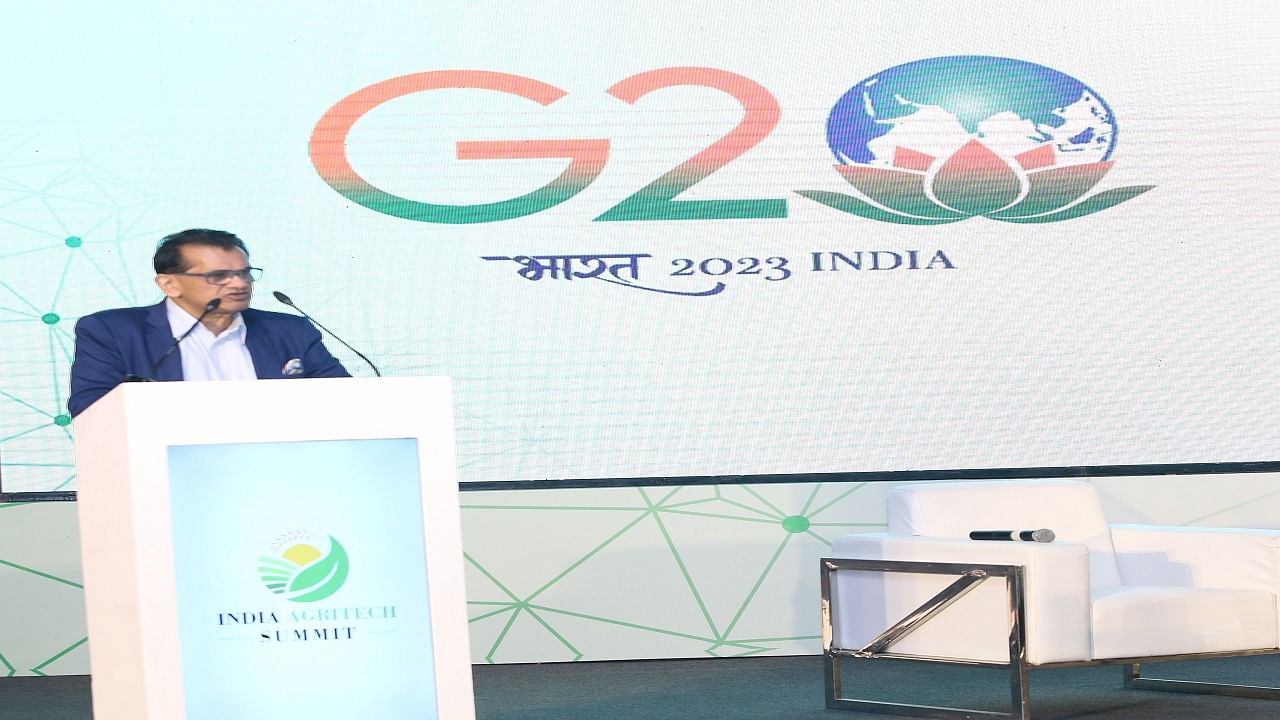
India's G20 Sherpa, Amitabh Kant, praises the focus on agricultural digitization during India's G20 presidency. He highlights its role in achieving a transformative, data-driven agriculture sector that addresses climate challenges and ushers in the next green revolution.
Kant was speaking at the G20 India Agri-tech Summit 2023 held on August 28 in Delhi. The Summit showcased India's commitment to driving innovation, collaboration, and sustainability in the realm of agriculture. The Summit, hosted as part of India's G20 Presidency, brought together thought leaders, experts, and stakeholders from across the globe to explore transformative solutions for the future of farming.
The Summit represented a crucial juncture in utilizing technology to tackle the challenges confronting the agricultural sector. With a strong focus on sustainability, the event emphasized the significance of incorporating policies, technological progress, and farmer-centered perspectives. The Summit's schedule was enhanced by enlightening keynote presentations, dynamic discussions among panels and informative exhibitions that highlighted cutting-edge advancements in agricultural technology.
Attendees participated in engaging conversations covering a wide range of subjects, such as policy shaping, sustainable agricultural practices, AI-powered agribusiness, and the welfare of farmers. A diverse array of participants, including start-ups in agri-tech, AI firms, scientists, and policymakers, were involved in the four-panel discussions hosted during the Summit.
India's G20 Sherpa, Amitabh Kant, graced the occasion with his visionary leadership. Addressing the opening plenary of the Summit, Kant said, “Transforming the agriculture sector into a data-driven, smart, and adaptive to climate change is integral to the transformation of the agriculture sector. This would entail focusing on aspects like open access agricultural data platforms and recognizing them as global public goods while co-opting startups and responsible investments from the private and public sectors for enhancing the welfare of farmers, especially small and marginal farmers. G20 members, being the major agricultural producers, consumers, and exporters, have come together to take a collective responsibility towards transitioning to a sustainable and resilient agricultural food system. Fundamentally, our ambition should be to transform agriculture, the agri-food sector into a very attractive and lucrative modern business enterprise. This needs to be done by keeping the farmers at the core of this digital revolution, by facilitating affordable access to an inclusive digital infrastructure, and by exploring digital tools that cater to the needs of the Agri sector.”
“The creation of a dynamic database that seamlessly interwinds precise information about farmers' characteristics and agriculture sector statistics, with a wealth of supplementary information encompassing weather patterns, demand and supply dynamics, market trends, and much more, has the potential to empower our farmers to make informed decisions. The implications of such a harmonized database extend far beyond mere convenience. Stakeholders across various domains, including the policymakers and experts who steer the trajectory of our progress, would find themselves empowered by key insights delivered through this data-sharing network,” emphasizing the need to create a harmonious database, Kant further added.
He also drew the Summit’s attention towards the importance of inclusive digital infrastructure and tools tailored to the needs of the agricultural sector.
During the course of the panel discussions, policymakers, industry experts, innovators, farmers, and investors paved the way for innovative approaches that can drive positive change across the agricultural landscape. With participants from across the world sharing agricultural experiences and strategies from different regions, the event presented a unique opportunity to gain a range of insights.
The Agri-tech Summit also recognized outstanding contributions, innovations, and initiatives that are shaping the future of agriculture. This spotlight on exceptional efforts served as a driving force for further advancements in the sector.
Through, the convergence of technology and agriculture, the summit has established a foundation for sustainable methodologies capable of bolstering food security, elevating livelihoods, and safeguarding the environment. The innovative solutions, collaborations, and insights presented during the course of panel discussions serve as the foundation for shaping the future of agriculture on a global scale.
















